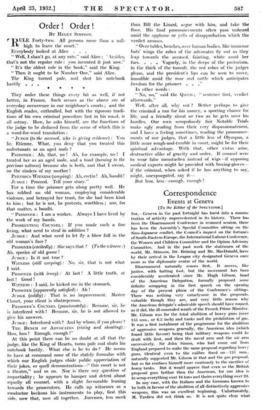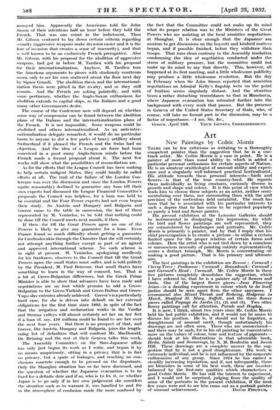Correspondence
Events at Geneva [To the Editor of the SPECTATOR.] SIR,—Geneva in the past fortnight has burst into a concen- tration of activity unprecedented in its history. There has been the Disarmament Conference in resumed session, there has been the Assembly's Special Committee sitting on the Sino-Japanese conflict, the Council's inquest on the fortunes of South-Eastern Europe, the International Labour Conference. the Women and Children Committee and the Opium Advisory Committee. And in the past week the statesmen of the world, Mr. Stimson, Dr. Briining and Mr. MacDonald, have by their arrival in the League city designated Geneva once more as the diplomatic centre of the world.
Disarmament naturally comes first. It moves, like justice, with halting foot, but the movement has been considerably accelerated since Mr. Hugh Gibson, head of the American Delegation, formally proposed some definite scrapping in the first speech on the opening day of the present phase of the Conference's sittings. There was nothing very cataclysmic in the proposals, valuable though they are, and very little reason why the American delegate's admirable speech should have roused, as it did, the ill-concealed wrath of the French Prime Minister. Mr. Gibson was for the total abolition of heavy guns (over 155 mm., or 6.2 inch) and tanks and the prohibition of gas. It was a first instalment of the programme for the abolition of aggressive weapons generally, the American idea (which found little favour) being that military weapons could be dealt with first, and then the naval arm and the air arm successively. Sir John Simon, who had come out from England prepared to make the same proposal regarding heavy guns, identical even to the calibre fixed on-155 nun.. naturally supported Mr. Gibson in that and the gas proposal, but so far confines himself more cautiously to the sacrifice or heavy tanks. But it would appear that even so the British proposal goes farther than the American, for our idea is to scrap everything over 16 tons and theirs everything over 20. In any ease, with the Italians and the Germans known to be both in favour of the abolition of all distinctively aggressive weapons, this was un excellent beginning. Unfortunately, M. Tardieu did not think so. It is not quite clear what annoyed him. Apparently the Americans told Sir John Simon of their intentions half an hour before they told the French. That was one count in the indictment. Then Mr. Gibson ventured to lay down certain criteria regarding security (aggressive weapons make invasion easier and it is the fear of invasion that creates a sense of insecurity), and that is well known to be an exclusively French prerogative. Also Mr. Gibson, with his proposal for the abolition of aggressive weapons, had got in before M. Tardieu with his proposal for their internationalization. Anyhow, M. Tardieu tore the American arguments to pieces with studiously courteous scorn, only to see his own scattered about the floor next day by Signor Grandi. The abolition thesis and the international- ization thesis were pitted in flit rivalry, and so they still remain. And the French are asking pointedly, and with some pertinence, whether the Anglo-Saxon enthusiasm for abolition extends to capital ships, as the Italians and a goOd many other Governments desire.
The course of the Conference now will depend on whether some way of compromise can be found between the abolition plans of the Italians and the internationalization plans of the French. It is not impossible.. Some weapons could be abolished and others internationalized. As an anti-inter- natioealization delegate remarked, it would do 'no particular harm to anyone to dot a few parks of heavy artillery about Switzerland if it pleased the French and the Swiss had no objection. And the idea of a League air force had been conceived in a good many Anglo-Saxon minds before the French made a formal proposal about it. The next few weeks will show what the possibilities of reconciliation are.
As for the efforts that the League Council has been making to help certain indigent States, they could hardly be called efforts at all. The trail of the failure of the London Con- ference was over the discussion and since the London Powers (quite reasonably) declined to guarantee any loan till their own experts had discussed the League-Financial Committee's proposals the Council was helpless, for a loan was held to be essential and the Four Power experts had not even begun their study. So Austria and Hungary and Bulgaria and Greece came to the table in succession, the last of them represented by M. Venizelos, to be told that nothing could be done till the Council meets next month, if then.
If then—for till the Great Powers agree no one of the Powers is likely to give any guarantee for a loan. Even France found so much difficulty about getting a guarantee for Czechoslovakia through the Chamber that she will certainly not attempt anything further except as part of an agreed and approved international scheme. No such scheme is in sight at present. M. Venizelos, apologizing needlessly for his frankness, observes to the Council that till the Great Powers agree the small States must suffer, and is told politely by the President, M. Paul Boncour, that small States have something to learn in the way of concord, too. That is a hit at Greco-Bulgarian differences, but the Greek Prime Minister is able to show that advances have been made and negotiations are on foot which promise to add a Greco- Bulgarian to the Greco-Turkish and Greco-Italian and Greco- Yugo-slav ententes already achieved. Greece's is a particularly hard case, for she is driven into default on her external obligations for the first time since 1898, in spite of the fact that the irrigation and reclamation works in the Vardar and Struna valleys will almost certainly set her on her feet if a loan of, say, £10 millions could be found to see her over the next four years. But there is no prospect of that, and Greece, like Austria, Hungary and Bulgaria, joins the length- ening list of defaulters that will confront Mr. MacDonald, Dr. Bruning and the rest at their Geneva talks this week.
The Assembly Committee on the Sino-Japanese affair has only just begun its work as I write, and begun it by no means auspiciously, sitting in a privacy that is in fact no privacy, but a spate of leakages, and reaching no con- clusions concrete enough to be pressed on the disputants. Only the Shanghai situation has so far been discussed, and the question of whether the Japanese evacuation is to be fixed for a definite date and if so, who is to fix it, or whether Japan is to go only if in her own judgement she considers the situation such as to warrant it was bandied to and fro in the atmosphere of confusion made the more confused by the fact that the Committee could not make up its mind what its proper relation was to the Ministers of the Great Powers who are assisting at the local armistice negotiations at Shanghai. It is clear enough that the Japanese are anxious to get discussiens on the boycott-and hindred matters begun, and if possible finished, before they withdraw their troops. That runs clean contrary to the Assembly resolution condemning the idea of negotiation conducted under the stress of military pressure, but the committee could not make up its mind to say that directly. This, however, all happened at its first meeting, and a little wholesome publicity may produce a little wholesome resolution. But the day in February when Sir John Simon reported that armistice negotiations on Admiral Kelly's flagship were an • the point of fruition seems singularly distant. And the situation bears a rather disturbing resemblance to that in Manchuria, where Japanese evacuation has retreated further into the background with every week that passes. But the presence in Geneva of the United States Secretary of State, who, of course, will take no formal part in the discussion, may be a factor of importance.—I am, Sir, &c., Geneva, April 19th. YOUR GENEVA CORRESPONDENT.







































 Previous page
Previous page